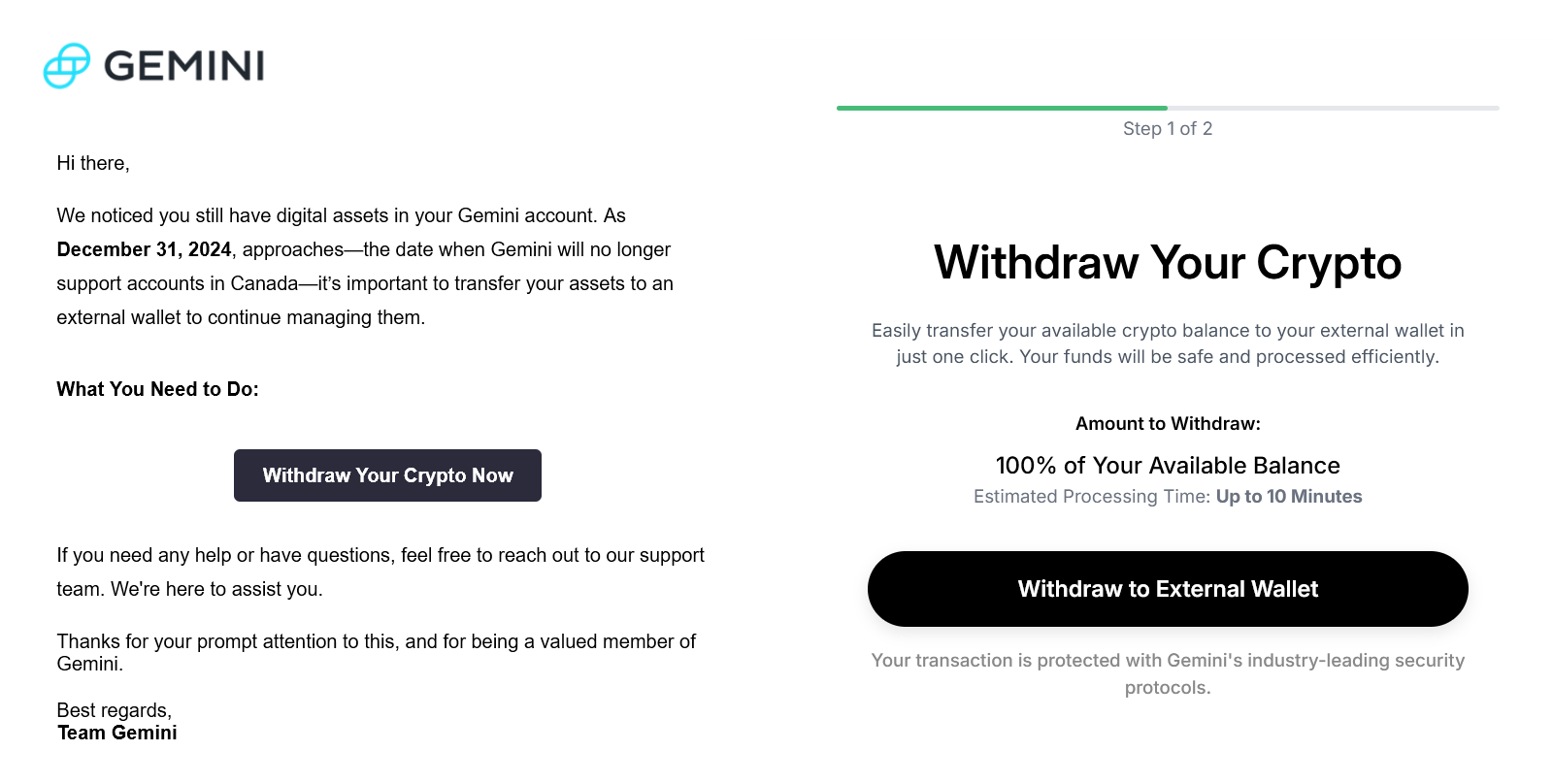The more popular cryptocurrency becomes, the more organized all kinds of scams directed against unwitting investors become. The unfortunate thing is that scams have grown more clever. Even the most seasoned crypto veteran can sometimes find himself entrapped. A good case in point: crypto exchange Gemini just announced it would be ceasing its operations in Canada by the end of the year. Let's dive deeper into this development and discuss some protective measures against cryptocurrency-related scams.
The Latest Crypto Scam
Gemini, a well-known cryptocurrency exchange, said it would wind down its operations in Canada by the end of this year. The exchange said Sept 30 that it was bowing out of the Canadian market due to the exacting requirements laid out by Canadian regulators-the same reason a number of other platforms have yanked themselves out of that country's market.
In an email to its Canadian clients, Gemini wrote to tell them they had 90 days to withdraw the funds. The email advised users to transfer any cryptocurrency holdings into an external wallet and to withdraw any fiat currency into their linked bank accounts.
While the notice by Gemini was valid, it has unfortunately opened up an avenue that scammers capitalized on. Many users, indeed, received emails appearing to originate from Gemini and urging them to log in and move their funds. What has materialized is quite far from safe.
How Crypto Phishing Scams Work
Most crypto phishing scams commence with a phishing email that looks uncannily like a real email from a legitimate exchange. Often, domain names are employed that are very similar to the real one, so in that case, the email is from an address such as [email protected]. That might sound valid to a glance, but it is fake. Sometimes, these emails may even have valid DomainKeys Identified Mail, or DKIM, signatures to further dupe users into believing they are authentic.
The links in these emails route users to Gemini sites that are just like the real Gemini website; if they log in, scammers steal the credentials. It doesn't stop there. After logging in, they might be requested to connect the wallet of their choice, giving the scammer control over any funds that were in transit.

How to Spot a Scam Email
Scam emails can sometimes be difficult to recognize; however, there are a few key flags to watch out for:
- Verify Domain Name: Gemini emails will always have the ending .gemini.com. Whatever the reason may be, if you receive an email from any other domain name @gemini.co.com, or anything similar in that effect, know that it is highly likely a scam.
- Grammar and spelling mistakes: Scammers usually have poor messages. Beware of inept phrasing or grammatical errors that you wouldn't expect from a professional company.
- Requesting sensitive information: Gemini will never ask you to provide your password, 2FA codes, and other important details via email. If you see such an email, instantly delete it.
- Lack of 2FA requirements: The majority of responsible exchanges, of which Gemini is one, require two-factor authentication to help safeguard an account. Typically, if you are really receiving an email stating you can bypass this, then that raises a red flag.
Protecting Your Crypto Assets
The following are best practices that will help you protect yourself from crypto scams:
- Verify the Sender's Email: address actually ends in @gemini.com. Phishing scammers will vary a very similar address.
- Use 2FA: enable 2FA on all accounts. This adds one layer of security. If your password has been compromised, the scammer cannot compromise your account without the 2FA code.
- Don't Click Links in Emails: You may prevent clicking on links; instead, go straight to the official website. This would lessen the chance that you may be forwarded to some phishing site.
- Hardware Wallet for Deeper Security: Keep your cryptocurrency in a hardware wallet instead of keeping it on an exchange. That way, if an exchange account is compromised, your funds will be safe

Remember: Gemini Only Offers Support via Email
Gemini, as a rule, does not give phone support. All their official support goes through emails, and therefore, if you get a phone call supposedly from someone working for Gemini, you are facing a scam. Any genuine correspondence from Gemini will carry the domain gemini.com such as [email protected] or [email protected].
Stay safe, and remember: when in doubt, verify the source before taking action!






